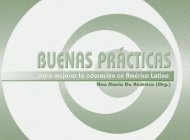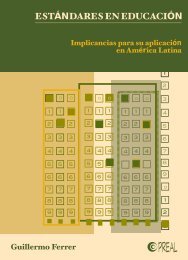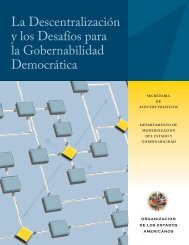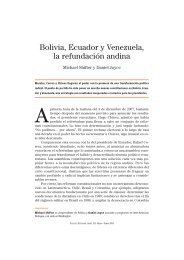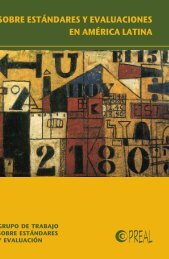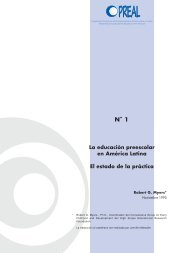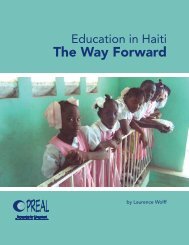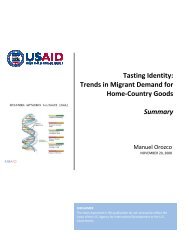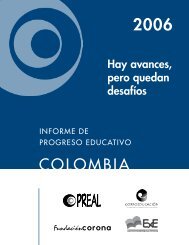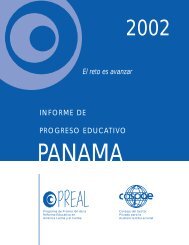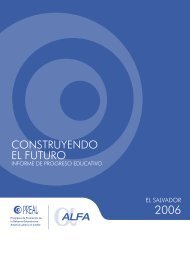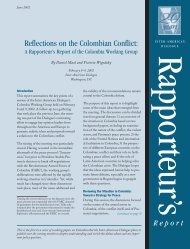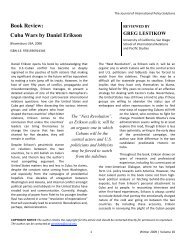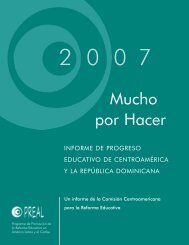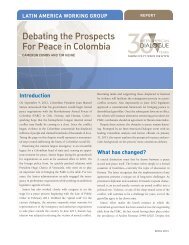Inter-American Dialogue
Inter-American Dialogue
Inter-American Dialogue
Create successful ePaper yourself
Turn your PDF publications into a flip-book with our unique Google optimized e-Paper software.
12<br />
“The U.S.<br />
should reject its<br />
‘uncompromising<br />
approach’ to Cuba and<br />
push for an eventual<br />
democratic transition<br />
and an end to<br />
repression on the<br />
island, a hemispheric<br />
policy group said today.<br />
‘It is time for the United<br />
States to shift to a<br />
policy of engagement to<br />
press the Cuban<br />
government to end its<br />
repressive practices,<br />
restore the rule of law<br />
and stop human rights<br />
abuses,’ the report<br />
said.<br />
”<br />
(Miami Herald,<br />
December 14, 2000)<br />
INTER-AMERICAN DIALOGUE<br />
2000 Program Report<br />
� Other <strong>Dialogue</strong> events in Washington<br />
that focused on Colombia included a<br />
roundtable discussion on September 6,<br />
featuring staff members Michael Shifter,<br />
Peter Vaky, and Paulo Wrobel who<br />
addressed President Clinton’s August<br />
30th trip to Colombia and the implications<br />
of the recently signed $1.3 billion<br />
aid package to that country. On April 5,<br />
Francisco Santos, a Colombian civic<br />
leader and editor of the newspaper El<br />
Tiempo, led a roundtable discussion on<br />
the prospects for peace in Colombia and<br />
the role of the civic movement No Más, a<br />
national campaign against kidnapping<br />
and violence. On March 17, the <strong>Dialogue</strong><br />
hosted the director of the Colombia<br />
office of the UN High Commissioner for<br />
Human Rights, Anders Kompass, who<br />
exchanged views on security and human<br />
rights conditions in Colombia with a<br />
select group of specialists, including<br />
Assistant Secretary of State for Democracy<br />
and Human Rights Harold Koh.<br />
Colombia’s human rights situation was<br />
also the topic of a February 29 private<br />
meeting featuring Gustavo Gallón and<br />
Carlos Rodríguez of the Colombian<br />
Commission of Jurists. Daniel García-<br />
Peña, former high commissioner for<br />
peace, also participated. On February 25,<br />
White House director of drug policy,<br />
General Barry McCaffrey, engaged some<br />
150 participants in a breakfast discussion<br />
on the latest political and security developments<br />
in Colombia.<br />
Cuba<br />
The <strong>Dialogue</strong>’s work on Cuba is designed to<br />
promote the reintegration of Cuba into the<br />
global economy. Toward that end, in October,<br />
the <strong>Dialogue</strong> sponsored the participation<br />
of Armando López, a prominent economist<br />
from the University of Havana’s Center for<br />
the Study of the <strong>Inter</strong>national Economy, in<br />
the fifth annual meeting of the Latin <strong>American</strong><br />
and Caribbean Economic Association<br />
(LACEA) in Rio de Janeiro, Brazil. López<br />
was the only Cuban at this meeting, which<br />
brings together the hemisphere’s most<br />
important economists and policy makers.<br />
� The <strong>Dialogue</strong>’s working group on Cuba,<br />
chaired by former World Bank Vice President<br />
for Latin America Shahid Javed<br />
Burki and coordinated by <strong>Dialogue</strong><br />
senior fellow Ana Julia Jatar, visited<br />
Havana during the last week of January<br />
to engage Cuban economic officials and<br />
analysts on the important issues facing<br />
the Cuban economy. Discussion focused<br />
both on Cuba’s economic policies and the<br />
country’s insertion into the global trading<br />
system, particularly its relations with the<br />
international financial institutions. The<br />
delegation included former IDB Vice<br />
President Nancy Birdsall and senior<br />
World Bank officials Guillermo Perry<br />
and Andrés Solimano. They met with<br />
Cuba’s Vice President Carlos Lage, Minister<br />
of Economy and Planning José Luis<br />
Rodríguez, Central Bank President Francisco<br />
Soberón, President of the National<br />
Assembly Ricardo Alarcón, and journalists<br />
and academics. At the end of May, a<br />
second trip included Burki and IDB chief<br />
economist Ricardo Hausmann, who traveled<br />
to Cuba at the invitation of the<br />
country’s Central Bank. They offered<br />
workshops on exchange rate harmonization<br />
and debt restructuring.<br />
� On October 16, the <strong>Dialogue</strong> and the<br />
United Nations Economic Commission<br />
for Latin America and the Caribbean<br />
(ECLAC) co-hosted a conference on the<br />
Cuban economy that focused on the<br />
recently released ECLAC report, The<br />
Cuban Economy: Structural Reforms and<br />
Economic Performance in the 1990s.<br />
� On October 26 and 27, the <strong>Dialogue</strong><br />
sponsored the participation of Cuban<br />
Central Bank Vice President Sergio<br />
Plasencia in the 13th Annual Latin<br />
<strong>American</strong> Network of Central Banks and<br />
Finance Ministries at the <strong>Inter</strong>-<strong>American</strong>



